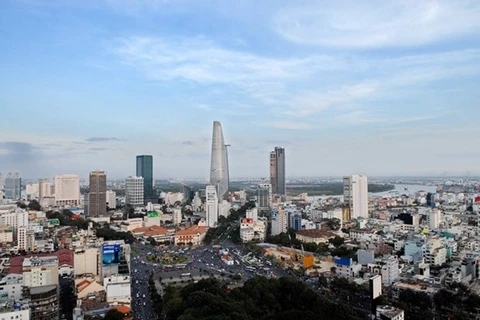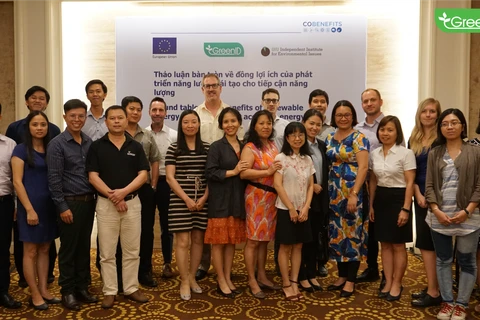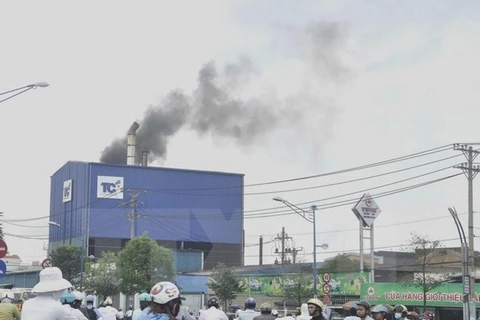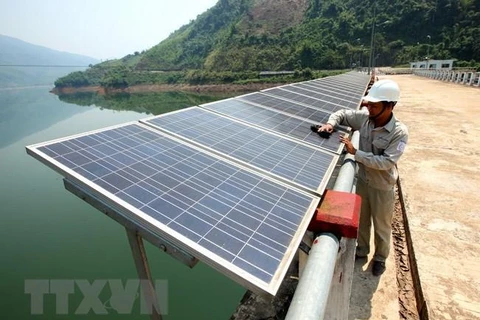Hanoi (VNS/VNA) - Factories which omit too much carbon dioxide waste will have to pay fees under a new pilot scheme in four provinces.
The plan was passed during a conference held in Hanoi on August 7.
The idea is for the next two years, 20 factories in Quang Ninh, Thanh Hoa, Quang Nam and Thua Thien- Hue will be under close watch and if they omit too much gas into the atmosphere they will be charged.
After approval from Prime Minister Nguyen Xuan Phuc, the Ministry of Agriculture and Rural Development detail plans to put the programme into play.
Twenty production facilities that have large greenhouse gas emissions, including nine thermo-power facilities and 11 cement production businesses.
It also stipulates the level of payment for production units engaged in thermal power trading with 4 VND per 1 kWh (equivalent to 2 USD per 1 tonne of carbon dioxide) and 2,100 VND per 1 tonne of clinker (equivalent to 1.35 USD per 1 tonne of carbon dioxide) for those engaged in cement production and trading.
According to Nguyen Van Vu, head of Finance and Planning Department under Vietnam Administration of Forestry (VAF), the payment is lower than the World Bank’s Forest Carbon Partnership Facility pledge to pay for emission reduction efforts in North Central Region which equals to 5 USD per tonne of carbon dioxide.
This level of payment would increase the electricity’s production cost as well as the factories’ cement production cost by 0.29 percent, he said, adding the price hike is still within the predicted rise of actual cost of the cement manufacturing sector – between 0.3-1 percent per year, he said.
It was expected the four provinces would collect about 172 billion VND (7.4 million USD) a year. Of these, Quang Ninh gained 123 billion VND while Thanh Hoa, Thua Thien- Hue and Quang Nam obtained 41 billion VND, 6 billion VND and 2 billion VND, respectively, Vu said.
These were significant sources of income for forest planting and protection at localities, especially for Quảng Ninh province where the collection of forest environmental service fee was very low - only about 4 billion VND per year.
The pilot implementation will take place from beginning of next year and finish by the end of 2021.
Nguyen Duc Son, Deputy Director of Dong Trieu Thermal Power Company, said the company supported the trial because thermal power emitted large greenhouse gas emissions. However, in the context of increasingly fierce competition, this cost must be included in the electricity price and a plan is needed for enterprises to implement, he said.
Son’s opinion was shared by Le Tri Thanh, Vice Chairman of the provincial People’s Committee of Quang Nam province.
Thanh said priority should be given to owners of forests which were close to the factories.
He also said the implementation should not affect the production plan of enterprises next year.
Addressing the conference, Ha Cong Tuan, Deputy Minister of Agriculture and Rural Development, said as Vietnam has been adopting measures to reduce greenhouse gas emissions and develop green economy, the payment of forest environment fee for absorption and retaining of forest carbon, gradually forming the carbon dioxide emission market was an evitable trend.
Tuan asked the VAF to collect comments from enterprises and localities so that the ministry would complete the document and submit to the Prime Minister in October this year.
The draft decision should clarify the scope of the application of the decision and the reason why it applied only to the two sectors – thermal power and cement production, he said.
The foundation for determining service prices, payment to service providers should also be made clear to ensure legitimate interests of participating enterprises, Tuan said.-VNS/VNA
The plan was passed during a conference held in Hanoi on August 7.
The idea is for the next two years, 20 factories in Quang Ninh, Thanh Hoa, Quang Nam and Thua Thien- Hue will be under close watch and if they omit too much gas into the atmosphere they will be charged.
After approval from Prime Minister Nguyen Xuan Phuc, the Ministry of Agriculture and Rural Development detail plans to put the programme into play.
Twenty production facilities that have large greenhouse gas emissions, including nine thermo-power facilities and 11 cement production businesses.
It also stipulates the level of payment for production units engaged in thermal power trading with 4 VND per 1 kWh (equivalent to 2 USD per 1 tonne of carbon dioxide) and 2,100 VND per 1 tonne of clinker (equivalent to 1.35 USD per 1 tonne of carbon dioxide) for those engaged in cement production and trading.
According to Nguyen Van Vu, head of Finance and Planning Department under Vietnam Administration of Forestry (VAF), the payment is lower than the World Bank’s Forest Carbon Partnership Facility pledge to pay for emission reduction efforts in North Central Region which equals to 5 USD per tonne of carbon dioxide.
This level of payment would increase the electricity’s production cost as well as the factories’ cement production cost by 0.29 percent, he said, adding the price hike is still within the predicted rise of actual cost of the cement manufacturing sector – between 0.3-1 percent per year, he said.
It was expected the four provinces would collect about 172 billion VND (7.4 million USD) a year. Of these, Quang Ninh gained 123 billion VND while Thanh Hoa, Thua Thien- Hue and Quang Nam obtained 41 billion VND, 6 billion VND and 2 billion VND, respectively, Vu said.
These were significant sources of income for forest planting and protection at localities, especially for Quảng Ninh province where the collection of forest environmental service fee was very low - only about 4 billion VND per year.
The pilot implementation will take place from beginning of next year and finish by the end of 2021.
Nguyen Duc Son, Deputy Director of Dong Trieu Thermal Power Company, said the company supported the trial because thermal power emitted large greenhouse gas emissions. However, in the context of increasingly fierce competition, this cost must be included in the electricity price and a plan is needed for enterprises to implement, he said.
Son’s opinion was shared by Le Tri Thanh, Vice Chairman of the provincial People’s Committee of Quang Nam province.
Thanh said priority should be given to owners of forests which were close to the factories.
He also said the implementation should not affect the production plan of enterprises next year.
Addressing the conference, Ha Cong Tuan, Deputy Minister of Agriculture and Rural Development, said as Vietnam has been adopting measures to reduce greenhouse gas emissions and develop green economy, the payment of forest environment fee for absorption and retaining of forest carbon, gradually forming the carbon dioxide emission market was an evitable trend.
Tuan asked the VAF to collect comments from enterprises and localities so that the ministry would complete the document and submit to the Prime Minister in October this year.
The draft decision should clarify the scope of the application of the decision and the reason why it applied only to the two sectors – thermal power and cement production, he said.
The foundation for determining service prices, payment to service providers should also be made clear to ensure legitimate interests of participating enterprises, Tuan said.-VNS/VNA
VNA
























